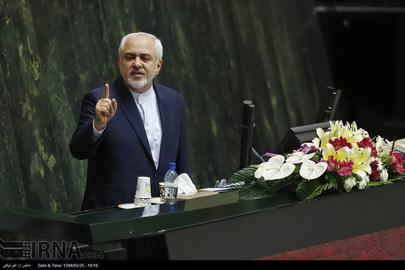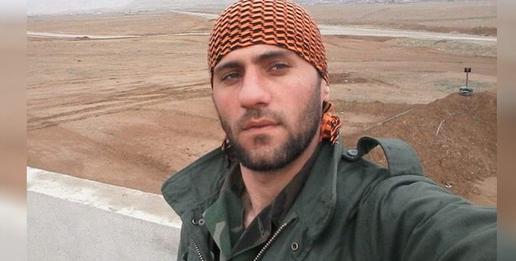Iranian MPs have begun the process of filing a judicial case against Mohammad Javad Zarif, the foreign minister and one of the most prominent members of Hassan Rouhani’s cabinet.
For the first time in the history of the Islamic Republic of Iran, the parliament is seeking to prosecute a minister and pursuing a judicial case that could lead to his dismissal, instead of his impeachment.
The MPs calling for the inquiry against Zarif objected to remarks he made following the assassination of Ghasem Soleimani — the commander of the Quds Force of the Revolutionary Guards — in which he stated that negotiations between Iran and the US would still be possible if sanctions are lifted.
The foreign minister’s controversial remarks appeared in German newspaper Der Spiegel, prompting outrage from US President Donald Trump, who rejected the idea of sanctions being lifted and a return to the negotiating table with members of the P5+1, the group of countries that had originally agreed on the nuclear deal, the Joint Comprehensive Plan of Action (JCPOA) — the US, the United Kingdom, France, China, Russia and Germany.
In a tweet published in both in English and Persian, Trump said: “The Iranian foreign minister says Iran wants to negotiate with the United States but wants sanctions lifted. No, thanks!”
Zarif had responded to a question posed by Der Spiegel. In light of the assassination of General Soleimain, would he rule out the possibility of negotiating with the United States, the paper asked? “No. I never rule out the possibility that people will change their approach and accept reality,” he said. “The Trump administration can amend the past, lift sanctions, and return to the negotiating table. We are still at the negotiating table.”
In Iran, protesters gathered outside the foreign ministry building and the minister’s office, denouncing Zarif’s remarks while waving red flags to signal their support for avenging Soleimani’s death.
At the same time, in parliament, there were mounting allegations against the foreign minister and widespread condemnation of Zarif’s statement. Amir Hossein Ghazizadeh, a cousin of a former minister of health and medical education and a former colleague of Mohammad Javad Zarif, offered to file a court case against him.
On the following day, 23 MPs signed a letter, citing Article 234 of the “Internal Regulations of the Islamic Republic’s Parliament,” calling for the prosecution of the minister for “comments contrary to the national interest and that undermine the sacred system of the Islamic Republic.”
Under Article 234, when at least 10 MPs or one of the parliamentary committees determines that the president or one of his ministers has committed an act of “non-compliance with, or infringement of, or failure to comply with the law or an incomplete law enforcement,” they can request a formal complaint to the governing board for review. Then the matter is referred to the relevant committee — for Zarif, it will be the National Security and Foreign Policy Commission. The appropriate committee must then submit its opinion to the board within 10 days.
The committee’s report is then voted on in the parliament and, if approved, the matter will be referred to the judiciary branch of the government, where it will be reviewed immediately. In the Islamic Republic of Iran, no ministerial matter has ever been referred to the judiciary by the parliament, and if Mohammad Javad Zarif’s case is brought to trial, he will be the first member of the Iranian government to go on trial during his tenure.
Will the Supreme Leader Intervene?
However, it is unlikely that the foreign minister will be prosecuted in the current environment, even if the complaint secures enough votes from MPs to take the matter further. If need be, Ayatollah Ali Khamenei will intervene to stop the process.
In reality, the remarks that offended so many people — in particular Iran’s conservative hardliners, but also others who felt his comments were out of line — actually echoes what the Supreme Leader has said before repeatedly: that negotiations with the US will be allowed if sanctions are lifted and the United States returns to the nuclear deal.
Ayatollah Khamenei, who has burned many bridges regarding opportunities for US-Iran talks during his 30-year reign, has built up a strong campaign of opposition against negotiations with the US, and with it, whole factions of people have become entirely oblivious to his comments that talks with the US could actually be viable, and that he would approve of it if the conditions were right.
Khamenei's supporters and those closely tied to him do not believe that the Supreme Leader has somehow arrived at the point where he has agreed to talks with the United States, and they also insist that the foreign minister of the Islamic Republic of Iran cannot take any uncoordinated step without the Leader’s approval.
But in the current political climate, Ayatollah Ali Khamenei cannot govern as he has done over the last three decades — carefully hiding his direct involvement in the running of the country’s day-to-day affairs. Now he must personally involve himself directly in matters that can stir up tensions in an already unstable nation.
Khamenei’s intervention to put an end to the Zarif controversy would damage and deplete government structures, and especially parliament. But if he does not become involved himself, it could lead to increased turbulence that would make the country even more challenging to govern.
visit the accountability section
In this section of Iran Wire, you can contact the officials and launch your campaign for various problems

























comments